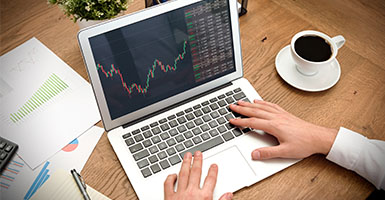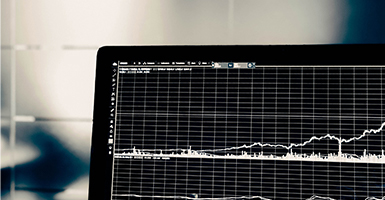Wei Li, Global Chief Investment Strategist together with Ben Powel, Chief Investment Strategist for APAC, and Axel Christensen, Chief Investment Strategist for LatAm & Iberia, all part of the BlackRock Investment Institute, share their insights on global economy, markets and geopolitics. Their views are theirs alone and are not intended to be construed as investment advice.
Oil and industrial metals have rallied since late-2020 on expectations for a swift economic restart, sparking talk of a new commodity “supercycle.” We see a more nuanced outlook – with a divergence across different commodities. The lift for oil from the economic restart is likely to be transitory, while some metals may benefit from structural trends such as the “green” transition for years to come, in our view.

Sources: BlackRock Investment Institute, with data Refinitiv, April 2021. Notes: Crude oil prices are represented by the spot Brent crude oil prices, and copper prices are represented by the London Metal Exchange spot copper prices.
Oil and copper are among the best-performing assets so far this year – after divergent performance last year. See the chart above. The post-pandemic restart – not a typical business cycle recovery – suggests the economy’s snapback from the Covid shock will likely be much swifter than the recoveries in the past, in our view. Growth in China – the world’s top commodity consumer – is already back to its pre-Covid trend, and the U.S. is close behind. This dynamic has buoyed commodities in recent months, yet we expect the support to fade once the economy returns to a modest growth trend. We see long-term dynamics at play too. The strength in copper (see the orange bars) partly stems from a supply crunch that is the result of years of underinvestment and increased capital discipline among major miners – and exacerbated by production disruptions caused by the pandemic. In addition, a transition to a low-carbon economy has provided long-term support for copper. In contrast, oil suffered a collapse in demand last year as travel demand dried up. Near-term demand may well return – but peak oil demand looms large.
We see structural dynamics potentially leading to long-lasting – and divergent – impact on two groups of commodities. The first is oil and other fossil fuels. A strong economic restart may still support prices of oil and related assets in the near term. Yet the prospect of peak oil demand is now well accepted, and we see the “green” transition likely to erode oil demand over the long run. The second group – certain industrial metals including copper, nickel and lithium – looks set to enjoy structural demand from that very transition for years to come. Decarbonization of the power system and electrification of the transport sector, for example, will be massive endeavors requiring a large-scale buildout of new infrastructure. At the same time, the increased focus on sustainability could make new mining projects more expensive and time-consuming to build, potentially aggravating the supply shortage and driving prices higher to incentivize greater production.
China’s commodity consumption was the key driver of the last commodities “supercycle” in the early 2000s – but this time may be different. We see more broad-based demand for industrial metals across developed and emerging markets (EM), thanks to a global policy revolution in response to the Covid shock and structural demand due to massive government spending on renewable energy and infrastructure. A remapping of global supply chains could also boost demand for raw materials as companies build facilities in new locations to increase their resilience to disruptions.
The bottom line: The powerful economic restart is likely to support many commodities in the near term, including oil. This should benefit the assets of commodity exporters, including some EMs. But the support from the powerful restart will be transitory, and we do not see a broad-based rise in global demand that buoys all commodities. Instead, we see a divergence story: The “green” transition will eventually erode demand for fossil fuels, potentially cutting short the duration of any price upswing. At the same time it looks likely to create structural demand for many industrial metals that may last for decades to come. Investing in commodities isn’t straightforward for most individual investors. Commodity-related equities is an option, yet there are risks specific to equity markets. Overall, our climate-aware return assumptions place energy and utilities sectors as laggards in long-term performance and expect technology and healthcare to benefit the most from the “green” transition, judging by their exposure to climate risks and opportunities. Over the tactical horizon, we tilt toward cyclicality and maintain a bias for quality. We are overweight U.S., emerging market and UK equities, as well as global high yield credit.
Market Updates

Past performance is not a reliable indicator of current or future results. Indexes are unmanaged and do not account for fees. It is not possible to invest directly in an index. Sources: BlackRock Investment Institute, with data from Refinitiv Datastream as of April 8, 2021. Notes: The two ends of the bars show the lowest and highest returns at any point this year to date, and the dots represent current year-to-date returns. Emerging market (EM), high yield and global corporate investment grade (IG) returns are denominated in U.S. dollars, and the rest in local currencies. Indexes or prices used are, in descending order: spot Brent crude, MSCI Europe Index, MSCI USA Index, MSCI Emerging Markets Index, the ICE U.S. Dollar Index (DXY), Bank of America Merrill Lynch Global High Yield Index, Refinitiv Datastream Italy 10-year benchmark government bond index,, Refinitiv Datastream Germany 10-year benchmark government bond index, Bank of America Merrill Lynch Global Broad Corporate Index, J.P. Morgan EMBI index, Refinitiv Datastream U.S. 10-year benchmark government bond index and spot gold.
Market backdrop
U.S. stocks hit new record highs and 10-year Treasury yields traded below the 14-month peak. The International Monetary Fund (IMF) raised its forecast for global growth to 6% for this year – the highest since the 1970s – citing unprecedented public spending especially in the U.S. We expect equities and other risk assets to be supported by the new nominal – a more muted response of government yields to stronger growth and higher inflation than in the past as central banks lean against any sharp yield rises.
Week Ahead
- April 12-19 – China total social financing and new yuan loans
- April 13 – Germany ZEW Indicator of Economic Sentiment
- April 15 – U.S. Philly Fed business survey, retail sales, industrial production
- April 16 – University of Michigan Surveys of Consumers; China industrial output
U.S. retail and consumer sentiment data will be in focus. Retail sales were expected to rise 4.7% in March after falling in the previous month, partly due to cold weather, according to a Reuters poll. The University of Michigan survey could shed light on consumer sentiment, after the lifting of restriction in some states and additional relief payment from the government.
BlackRock’s Key risks & Disclaimers:
This material is not intended to be relied upon as a forecast, research or investment advice, and is not a recommendation, offer or solicitation to buy or sell any securities or to adopt any investment strategy. The opinions expressed are as of April 12th, 2021 and may change. The information and opinions are derived from proprietary and non-proprietary sources deemed by BlackRock to be reliable, are not necessarily all-inclusive and are not guaranteed as to accuracy. As such, no warranty of accuracy or reliability is given and no responsibility arising in any other way for errors and omissions (including responsibility to any person by reason of negligence) is accepted by BlackRock, its officers, employees or agents. This material may contain ’forward looking’ information that is not purely historical in nature. Such information may include, among other things, projections and forecasts. There is no guarantee that any forecasts made will come to pass. Reliance upon information in this material is at the sole discretion of the reader.
The information provided here is neither tax nor legal advice. Investors should speak to their tax professional for specific information regarding their tax situation. Investment involves risk including possible loss of principal. International investing involves risks, including risks related to foreign currency, limited liquidity, less government regulation, and the possibility of substantial volatility due to adverse political, economic or other developments. These risks are often heightened for investments in emerging/developing markets or smaller capital markets.
Issued by BlackRock Investment Management (UK) Limited, authorized and regulated by the Financial Conduct Authority. Registered office: 12 Throgmorton Avenue, London, EC2N 2DL.
MeDirect Disclaimers:
This information has been accurately reproduced, as received from BlackRock Investment Management (UK) Limited. No information has been omitted which would render the reproduced information inaccurate or misleading. This information is being distributed by MeDirect Bank (Malta) plc to its customers. The information contained in this document is for general information purposes only and is not intended to provide legal or other professional advice nor does it commit MeDirect Bank (Malta) plc to any obligation whatsoever. The information available in this document is not intended to be a suggestion, recommendation or solicitation to buy, hold or sell, any securities and is not guaranteed as to accuracy or completeness.
The financial instruments discussed in the document may not be suitable for all investors and investors must make their own informed decisions and seek their own advice regarding the appropriateness of investing in financial instruments or implementing strategies discussed herein.
If you invest in this product you may lose some or all of the money you invest. The value of your investment may go down as well as up. A commission or sales fee may be charged at the time of the initial purchase for an investment. Any income you get from this investment may go down as well as up. This product may be affected by changes in currency exchange rate movements thereby affecting your investment return therefrom. The performance figures quoted refer to the past and past performance is not a guarantee of future performance or a reliable guide to future performance. Any decision to invest in a mutual fund should always be based upon the details contained in the Prospectus and Key Investor Information Document (KIID), which may be obtained from MeDirect Bank (Malta) plc.

